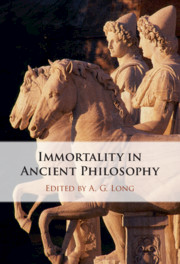Book contents
- Immortality in Ancient Philosophy
- Immortality in Ancient Philosophy
- Copyright page
- Contents
- Contributors
- Introduction
- Chapter 1 The Soul and the Celestial Afterlife in Greek Philosophy before Plato
- Chapter 2 Pythagorean Immortality of the Soul?
- Chapter 3 The Philosopher’s Reward: Contemplation and Immortality in Plato’s Dialogues
- Chapter 4 Pre-Existence, Life after Death, and Atemporal Beings in Plato’s Phaedo
- Chapter 5 The Immortal and the Imperishable in Aristotle, Early Stoicism, and Epicureanism
- Chapter 6 Socrates and the Symmetry Argument
- Chapter 7 Immortality in Philo of Alexandria
- Chapter 8 Plotinus on Immortality and the Problem of Personal Identity
- Chapter 9 Truth and Immortality in Augustine’s Soliloquies and De Immortalitate Animae
- Index of Passages
- Index of Names and Subjects
- References
Introduction
Published online by Cambridge University Press: 20 May 2021
- Immortality in Ancient Philosophy
- Immortality in Ancient Philosophy
- Copyright page
- Contents
- Contributors
- Introduction
- Chapter 1 The Soul and the Celestial Afterlife in Greek Philosophy before Plato
- Chapter 2 Pythagorean Immortality of the Soul?
- Chapter 3 The Philosopher’s Reward: Contemplation and Immortality in Plato’s Dialogues
- Chapter 4 Pre-Existence, Life after Death, and Atemporal Beings in Plato’s Phaedo
- Chapter 5 The Immortal and the Imperishable in Aristotle, Early Stoicism, and Epicureanism
- Chapter 6 Socrates and the Symmetry Argument
- Chapter 7 Immortality in Philo of Alexandria
- Chapter 8 Plotinus on Immortality and the Problem of Personal Identity
- Chapter 9 Truth and Immortality in Augustine’s Soliloquies and De Immortalitate Animae
- Index of Passages
- Index of Names and Subjects
- References
Summary
When ancient philosophers describe the fate of the soul or the human being after death, in which cases should we attribute to them a theory of immortality? When their texts describe people – or their souls, parts, or possessions – as being or becoming ‘immortal’, what does the word mean? The research brought together here explores these questions. Whether or not we should stipulate the meaning of immortality depends on which question we are addressing. The first question is about our own use of the words ‘immortal’ and ‘immortality’ when reading and trying to understand ancient theories, and here it may be appropriate to set down that ‘immortal’ means, for example, everlasting. That is how Phillip Horky understands ‘immortal’ and ‘immortality’ in his chapter on whether Pythagorean theories of reincarnation (or, as it is also called, the transmigration of souls) require souls to be everlasting.
- Type
- Chapter
- Information
- Immortality in Ancient Philosophy , pp. 1 - 11Publisher: Cambridge University PressPrint publication year: 2021

